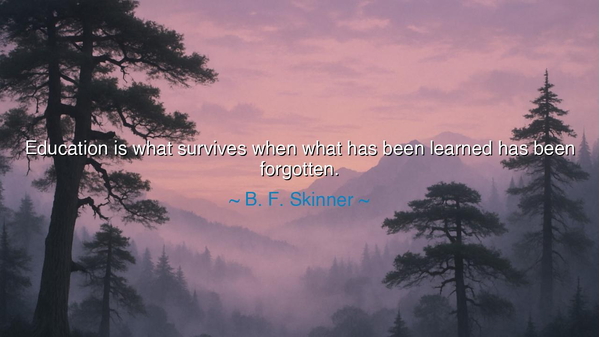
Education is what survives when what has been learned has been






“Education is what survives when what has been learned has been forgotten.” So spoke B. F. Skinner, the great thinker who sought to understand not just how people learn, but why they continue to grow long after the lessons themselves fade. His words are not cold philosophy but living fire — they remind us that education is not merely a storehouse of facts, but the formation of the mind and spirit. What we remember in the end is not the detail, but the discipline; not the equation, but the insight; not the words, but the wisdom they awakened.
In this saying, Skinner separates the temporary from the eternal. Knowledge, he tells us, is like writing on the sand — the waves of time may wash it away. But true education carves itself upon the soul. It shapes how we think, how we act, how we face the world. You may forget the exact teachings of your youth, the formulas, the rules, the dates — but the habits of mind you forged while learning, the curiosity, the resilience, the love of truth, these remain. They are the unseen roots that keep the tree alive when the flowers of memory have fallen.
The origin of this quote lies in Skinner’s lifelong study of learning and behavior. He saw that true teaching is not about filling the mind with information, but about training the spirit to seek understanding even when no teacher is present. For him, education was not the lesson itself, but the power to continue learning when the lesson was gone. It is the quiet flame that endures after the candle has burned away — the strength to reason, to question, to adapt. In this way, Skinner’s insight belongs not just to science, but to philosophy, to all who believe that wisdom is the ultimate inheritance of humankind.
Think of Socrates, the father of philosophy, who never wrote a single book. His students, like Plato, could not quote all he said, for his words were not meant to be memorized, but lived. When Socrates was condemned to die, his teachings did not perish with him; they survived because he had awakened something deeper in his students — a love of inquiry that could not be forgotten. That, too, is what Skinner meant: when facts fade, education survives, because it has become part of who we are.
So it is with every human soul. A child may forget the stories of arithmetic, but remember how to solve problems through persistence. A musician may forget the first scales they learned, but never lose the rhythm that shapes their soul. A scientist may forget the details of every experiment, but never lose the spirit of curiosity that drives discovery. The content of learning is temporary; the character it forms is eternal. What we learn dies as words — what we understand lives as wisdom.
Skinner’s words are also a warning to teachers and students alike. Too often we mistake education for the accumulation of facts — test scores, credentials, and degrees. But what good are these, if they leave no mark upon the soul? To teach is not to fill a vessel, but to light a flame. To learn is not to gather information, but to be transformed by it. The true teacher awakens something that cannot be forgotten — a way of seeing, a way of being. This is what survives when all else fades.
Consider also the story of Nelson Mandela, who, during his long imprisonment, was denied books, freedom, and teachers. Yet, though stripped of every physical means of learning, his education remained within him. He had learned endurance, reflection, and faith in the power of justice. These lessons did not come from any textbook; they were the surviving fruits of a lifelong education that had taken root in his spirit. When he emerged from prison, it was not with forgotten knowledge, but with unshakable wisdom — proof that true education cannot be erased by time or hardship.
So, my listener, take this truth into your heart: what you learn may one day fade, but what you become through learning will endure. Let your education not end with the closing of a book or the passing of a test. Seek to be shaped, not merely instructed; to be deepened, not merely informed. Let knowledge be the seed, but let wisdom be the tree. For when memory fails and the pages are lost, it is your education — your cultivated mind and noble spirit — that will guide you, steady as a compass, through the storms of life.
Thus remember, as B. F. Skinner taught: true education does not live in the mind’s memory, but in the soul’s transformation. It is what remains when all else is gone — the quiet strength that endures, the light that continues to burn, even after the words have faded into silence.






AAdministratorAdministrator
Welcome, honored guests. Please leave a comment, we will respond soon